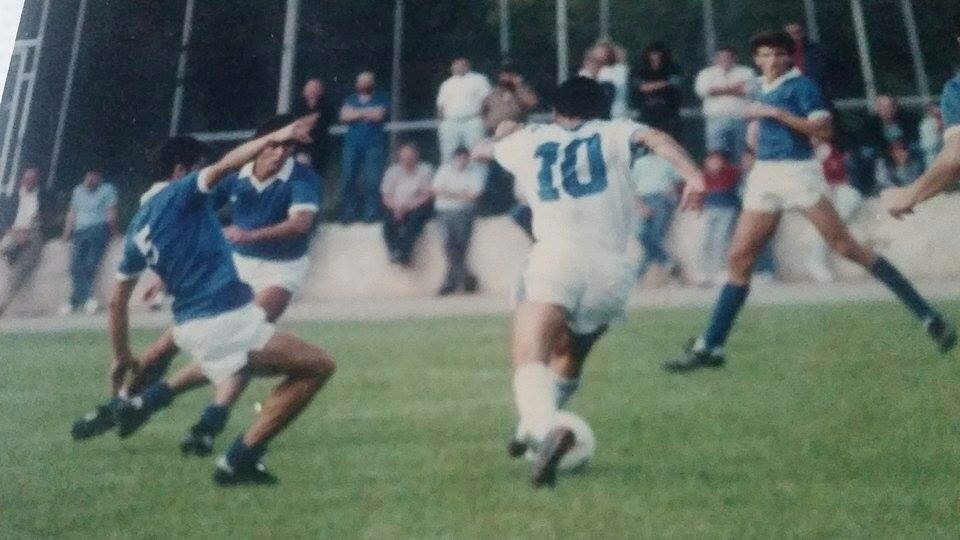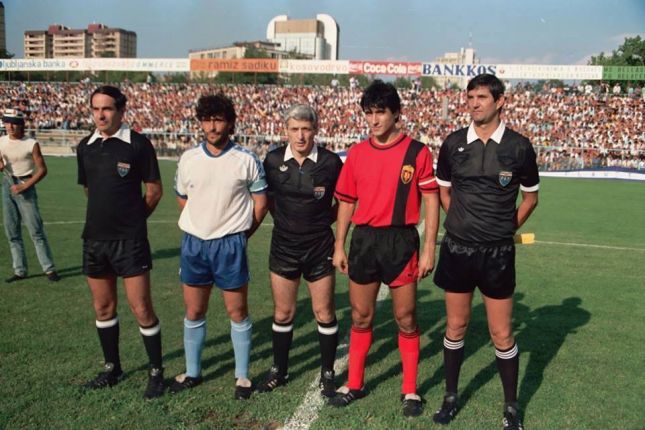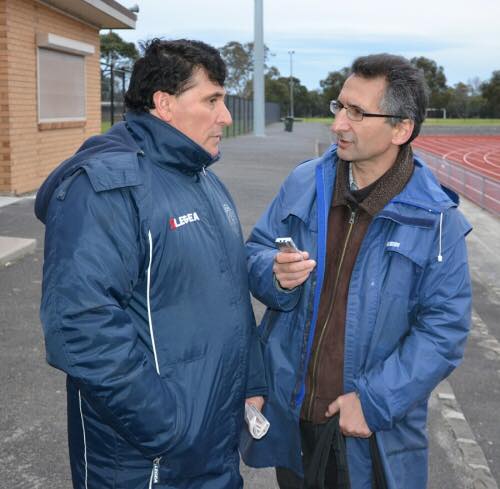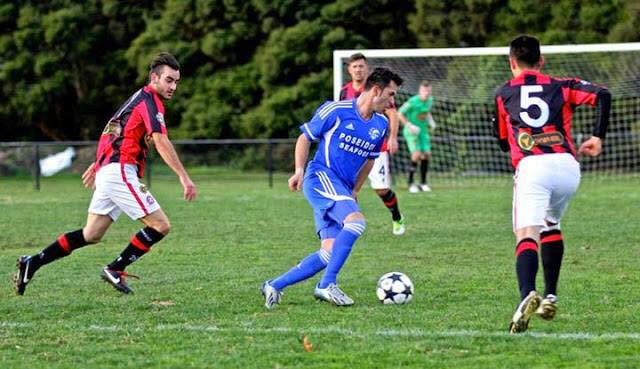Before Besart Berisha, there was another Kosovar Albanian footballer making his mark on Australian football. Fadil Muriqi – the “Kosovan Maradona” – enjoyed an illustrious career in Yugoslavia before migrating his family to Australia in 1991 where he continued his career. Son Rinor followed in his footsteps and has made his name in the Victorian state leagues. Their football journey has taken them from their native Kosovo to Australia, back to their homeland, and once more Down Under.
Muriqi senior is one of the greatest footballers to ever come out of Kosovo, the former province of Yugoslavia which recently gained independence from Serbia. He formed part of regional side FK Pristina’s golden generation, which in the 1980s gained promotion into the Yugoslav First League and maintained its presence in one of Europe’s best leagues at the time for five successive seasons. Following spells in Croatia and Turkey, Fadil accepted an invitation to join Sydney Croatia in the NSL in 1991. Further spells at Canberra FC, Dandenong Thunder, Fawkner Blues and Chelsea Hajduk (now Dandenong City) followed, after which Fadil returned to Kosovo in 2001 to coach. He returned to Australia once more in 2006, managing Dandenong City and Heatherton United.
It was whilst the Muriqi family travelled with Fadil on his football journeys that Rinor developed his own love for the game. Having spent his formative years in Kosovo, Rinor returned to break into the Melbourne Knights first team as a 17-year-old, before leaving and enduring a tough period at Dandenong Thunder. A spell under his father’s guidance at Dandenong City was followed by a move to Altona Magic. Two successive seasons at Box Hill United then saw Rinor flourish, playing alongside a talented squad and forming an impressive strike partnership with Kenny Athiu. His good form earnt him a move to Green Gully, where he has impressed so far this season.
Fadil’s beginning – FK Pristina
It all began for Fadil in the 1970’s Kosovo, where he developed the footballing skills that would earn him legendary status. Born in Pec, one of Kosovo’s largest cities, the family’s sporting nature saw Fadil take up football along with both his brothers at an early age. Starting off at local junior clubs, his big break came when he earned a move to Buducnost Pec and made his debut as an 18-year-old. A breakthrough season saw him transfer to regional power FK Pristina in 1979, who were determined to earn promotion to the Yugoslav First Division. He spent the next ten years at the club – which went through a golden era – alongside his brother Xhevdet and the likes of star striker Fadil Vokrri, Kujtim Shala and Agim Cana (father of current Lazio & Albania captain Lorik).
Fadil recalls those years fondly. “They were great times etched in memory as we enjoyed considerable success during those years,” he says.
“We eagerly awaited every week when we’d either welcome visiting clubs to Pristina or go away to other parts of the country to play the opposition sides.”

His physique and playing style saw him draw comparisons with Diego Maradona. The number ten, together with goal scorer Vokrri, spearheaded the side to many memorable upset victories over the big guns of Yugoslav football.
“Many results stand out, but a historic 3-1 away win over Red Star Belgrade, a 3-2 win over Dinamo Zagreb in which I scored twice, and a 3-1 defeat of Velez Mostar where I scored a hat-trick, were the highlights,” he says.
“It was a great experience to play against such clubs in packed-out stadiums and the quality at the time was very good. At Pristina we were privileged to have a few very good coaches like Bela Palfi, Fuad Muzurovic [who later became Bosnia’s first national team manager], Vukasin Visnjevac and Miroslav Blazevic [who led Croatia to third place at the 1998 World Cup].”

After successive mid-table finishes, poor results in the 1987/88 season saw the club relegated back to the second division. After staying on with the club for a further season, first division side Rijeka secured his signature in 1989.
“An Albanian friend of mine was at Rijeka at time and he convinced me [and my brother] to join the club at whom I enjoyed a good season at,” he says.
His next port of call was Turkey, where he spent a season at Konyaspor at the start of the 90’s, before returning to Rijeka.
To Australia and back
With the political situation in the former Yugoslavia deteriorating, Fadil’s coach at Rijeka, Mladen Vrankovic influenced the playmaker to move with him to Australia after accepting an offer to coach Sydney Croatia in the NSL.
“It was strange coming to Australia at first, as the time zones and weather were different while I did not know what to expect of Australia football at the time,” he says.
Fadil scored on debut in a 3-1 loss to Heidelberg United which featured a young Mark Bosnich and Tony Popovic. He extended his initial six month stint in Australia after “falling in love with Australia and deciding to move the family down here as well”. Further spells at Canberra FC, Dandenong Thunder (for whom he became player-coach for in 1998), Fawkner Blues and Chelsea Hajduk followed, before Muriqi hung up his boots in 2001 at the ripe old age of 41.
“During those times in Australia, there were many great footballers who were not financially well off as the ones of today,” he says.
With the conflict in Kosovo over, Fadil moved the family back to the homeland in 2001. There he worked closely in developing the next generation of Kosovan talent, undertook some football punditry, and coached his former side Pristina in 2005 and 2006.
“That was a good year for me returning to the club, where I had the most success as I was working within the junior set up of the club,” he says.
A subsequent economic crisis struck the region, forcing the family to move back to Australia, where Fadil enjoyed a few coaching spells in the lower leagues of Victorian football while casting an eye out on the progression of Rinor’s senior career.


